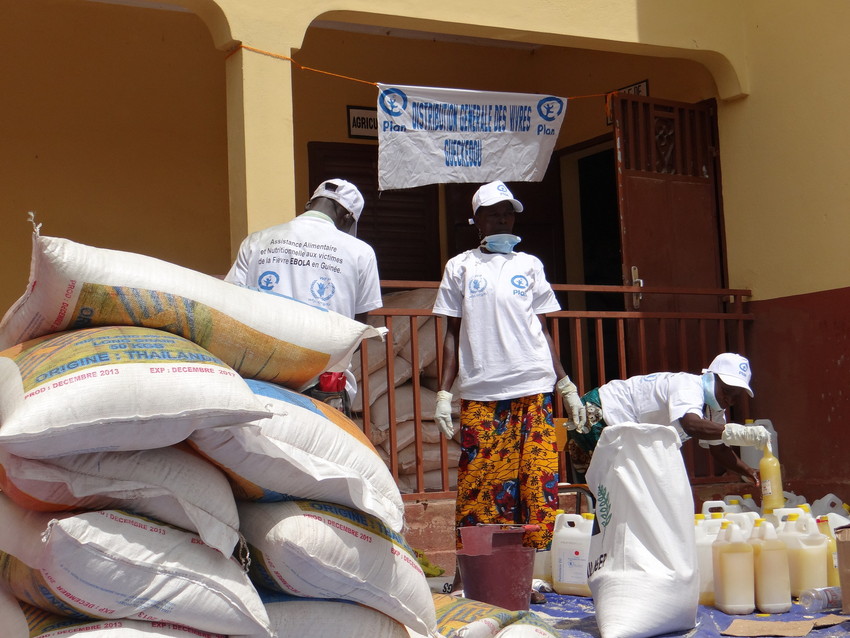
2.5M People Reached

Plan (a DEC member) staff prepare food packages at a distribution centre in Guinea
Disasters Emergency Committee (DEC) member agencies are scaling up their aid efforts in West Africa where they have already helped over 2.5 million people affected by the Ebola crisis.
The urgent appeal for funds is essential to help member agencies intensify their efforts to stop the explosive spread of the disease and support those affected.
DEC Chief Executive Saleh Saeed said:
“Aid workers are on the front line in the fight against Ebola. Some are facing great risk and local staff and partners are also being ostracised by their friends and families because people are so terrified.
“This is a price they are prepared to pay as they struggle to stop the spread of the disease and support those affected by the crisis. They need your help NOW not only to support medical treatment but to bury the dead safely, care for Ebola orphans, help families disinfect their homes, provide food to people in quarantine and, critically, to teach communities how to keep themselves safe and stop the spread of Ebola.”
This is the first time in the DEC’s 50-year history that it has launched an appeal in response to a disease outbreak: an historic move that reflects the scale of the situation.
The Ebola outbreak is the most severe the world has ever seen: it has so far infected over 10,000 people and killed nearly 5,000 more, with the World Health Organisation warning of up to 10,000 new cases a week by December if it is not contained.
In addition to the 2.5 million people reached by DEC member agencies’ efforts, several hundreds of thousands more have been targeted by radio broadcasts and print materials containing life-saving messages on how communities can safeguard themselves from the disease.
Amongst the aid delivered activities so far include:
- ActionAid has reached over 271,000 people in Sierra Leone and Liberia, delivering sanitation supplies to medical facilities, giving food and clothing to affected families and running public information campaigns.
- British Red Cross partners have buried 3,595 victims of Ebola safely and with dignity across Sierra Leone, Liberia and Guinea. They have helped to trace over 41,000 at-risk individuals.
- CAFOD is giving food aid to over 9,000 quarantined families, providing sanitation materials and training faith leaders to raise awareness of safe burial practices.
- CARE International has distributed hygiene packs to 1,100 vulnerable and quarantined households in Sierra Leone, reaching 53,000 people. The kits include soap, buckets fitted with taps and other essential materials.
- Christian Aid is distributing food and hygiene kits to over 2,000 quarantined residents in Ebola hotspots and has reached 1.2 million people with awareness raising work, run by 900 volunteers using existing community networks.
- Concern Worldwide is managing burial teams, educating communities on prevention methods and supporting district health workers. It has reached 170,000 people in Sierra Leone and Liberia.
- Oxfam is providing hygiene kits, giving health and burial workers protective clothing, supplying water to treatment and isolation centres, and co-ordinating door-to-door awareness-raising campaigns. It has reached almost 500,000 people.
- Plan UK is giving psychosocial care to children, and has distributed food and sanitation kits to nearly 45,000 people.
- Save the Children are building and managing health and community care centres where Ebola sufferers can be isolated and treated. It is training health volunteers and providing medical supplies.
- Tearfund is working with over 1,000 churches to curb transmission, reaching over 350,000 people with prevention advice and distributing 2,600 hygiene kits to families.
- World Vision has reached 7,500 people in mosques and churches with disease prevention advice and is providing materials to health workers.

